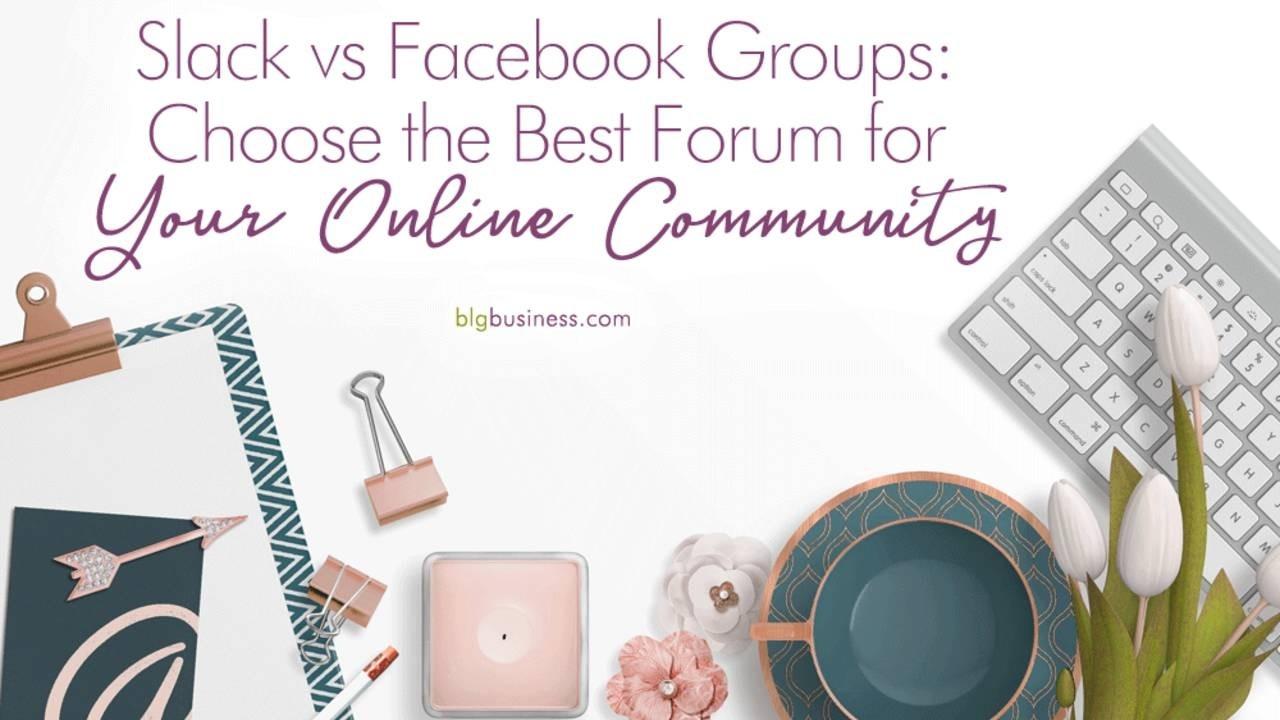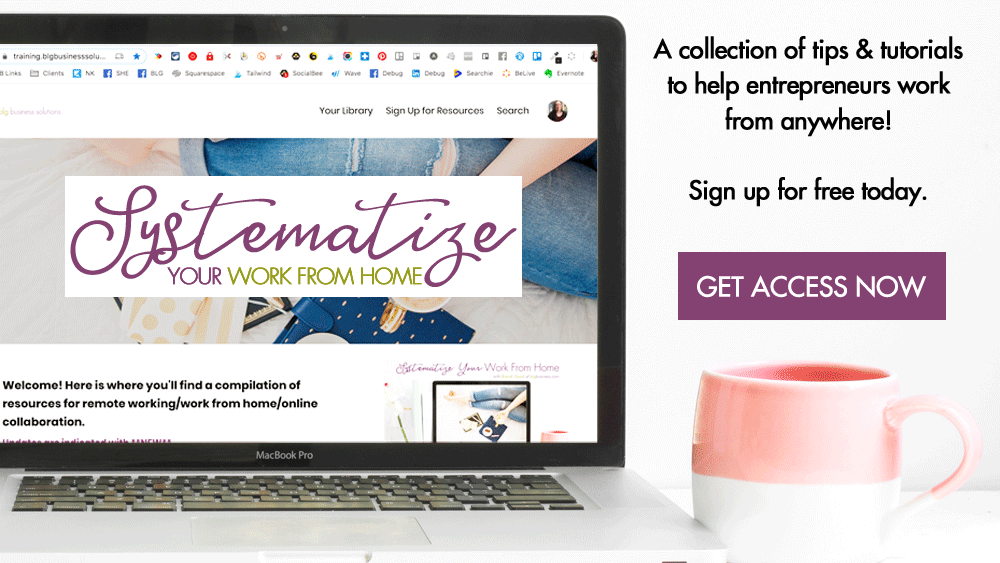Slack vs Facebook Groups: Choose the Best Forum for Your Online Community

While Facebook Groups are still the most common solution for discussion forums for online courses and membership communities, people are starting to look at alternatives. In this post I’m comparing Slack with groups so that you can see which solution might be best for your next online program.
Terminology
To prevent any confusion, here’s a quick 101 about terminology for those that aren’t familiar with Slack:
- Workspace = Facebook Group
- Channel = no real equivalent in Facebook groups (unless you think of each post as a thread and all of the associated comments as posts and replies…)
- Post = Group Post
- Thread = Facebook Comments/Replies
- Message = Facebook Direct Message
Slack
Generally, Slack has been used most in tech companies but has been growing in popularity for small businesses and entrepreneurs that work with a large group of third parties and need 1 place for everyone to communicate efficiently - while still being able to control who can see what.
Even more recently I’ve been seeing it used as a community forum for online courses and membership groups in place of Facebook Groups. Here are the pros and cons of using Slack for your next online program.
Pros
- Their free plan is generous. All plans have all features - the only limitations on a free account is integrations (you can connect up to 10) and access to older posts/messages (you can view & search the last 10,000 items).
- Slack is better for creating long-term discussions around specific topics because of the channel feature.
- Integrates with sooooo many things. You can do things like:
- Send updates from your PM software to a Slack channel
- Have calendar invites come to your Slack workspace (so you can respond without opening your email or calendar)
- Connect Drive or Dropbox to easily share files with other members
- Connect Zoom to have meetings right from Slack
- You can set permissions and privacy for individual channels. For example, if you had a course with an optional add-on, you could have some channels for all students and then one special channel that only has students that purchased the add-on (and only they can see it). You can also have a channel for your internal team to discuss progress or troubleshoot student issues (if you don’t already have another workspace for internal stuff).
- Has a great standalone mobile app.
- Also has a desktop app which provides 1 major benefit over the web version: if you are a member of several workspaces it can be a pain to switch back and forth to see if there is anything you need to look at - if you have the desktop app you can see unread notifications for your workspaces all in 1 place without having to switch.
- Users can set more customized notifications, such as:
- Pausing all notifications for a period of time you set
- Marking yourself as active or inactive (don’t impact functionality)
- Getting notified when a specific keyword is used by someone (regardless of whether you’ve been tagged or are following the thread)
- Set the hours you want to receive notifications (for example, during your office hours only)
- Users can ‘mute’ channels if they become busy or distracting. You’ll still get a notification if someone directly mentions you.
- You can search for keywords, mentions, saved messages, and more across all channels or just within a specific channel or message area.
- It’s simple for members to have private conversations with each other.
- You can easily create private or visible breakout rooms for groups of members which can be permanent or temporary depending on your needs.
- You can easily notify everyone in your space about critical messages by tagging @everyone
- You can see unread notifications for anything new that’s happened since you last looked at a channel.
- You can upload and share pretty much any type of file.
Cons
- On a free plan, you can see the last 10,000 messages - if your community is especially busy this means that older messages won’t be viewable/searchable unless you upgrade. For most people starting out this won’t be an issue. If there is a lot of valuable evergreen content like instructions or answers to user questions then you might want to collect these as you go to repost later.
- The power and frustration of Slack is its flexibility - if it's not set up in a way that makes sense to users based on your course or membership needs your discussions can become messy and confusing.
- Less people are familiar with how Slack works so you’ll need to do some education to prevent your discussions from becoming messy and confusing. If your students are brand new to Slack I’d suggest only setting up a couple of starting channels (i.e. “How to Use Slack”, “Welcome to the Course”, “Introductions”) to get them familiar with things before adding more.
- People who have never used Slack may be reluctant to create a new account they need to check. I can vouch for this personally: a course I joined recently was using Telegram for communication. I absolutely didn’t want to have yet another place to check messages so I didn’t join, which left me super disengaged, which meant I barely started the course, nevermind finishing it :)
- It can be more time to set up - you’ll have to think about how you want to structure your workspace to make it effective. For example, lots of threads for specific topics, or a few general topics? It's a delicate balance because too many threads can become confusing and people don’t know where to post, but too few threads can result in a jumble of different discussions going on in the same place. Make sure the names of your threads are clear and add a channel description if needed.
Facebook Groups
Facebook Groups are definitely the most common solution for courses or membership forums. People have started moving away from Facebook & Facebook Groups recently due to privacy and business ethics concerns, so other alternatives are popping up.
That being said, a Facebook Group might still be the right solution for your students, or it might be the best place to get started for now. Here are the pros and cons of using Facebook Groups for your next online program.
Pros
- Groups are completely free to use with unlimited features.
- Livestreams!
- Most people are already on Facebook so they won’t need to sign up for something new.
- Most people have some familiarity with how groups work.
- If you have scheduled events during your course or membership there is built-in functionality for scheduling & RSVPing for events.
- Groups have better member moderation functionality, plus some automated moderation for things that violate Facebook terms and conditions.
- Super simple to set up.
- Announcements and pinned messages are a great way to make sure the most important thing gets seen when someone comes to the group.
- Has some analytics around group activity to give you an idea of how many students are actually seeing and engaging with the content there.
Cons
- People are definitely suffering from Facebook Group overwhelm so if your people are in a lot of groups they may join but never engage with your content or miss important notifications. If you have a group that goes along with a paid course I highly recommend also sending emails for critical information.
- Facebook has definitely let people down when it comes to their business practices, so some people refuse to use Facebook just because of that. And right now in particular many people are staying away from their Facebook feed for mental health reasons.
- Facebook is designed to be distracting - unless you bookmark a group URL and only view it on mobile your students are going to be bombarded by posts from friends, business, and other groups, plus sidebar ads and notifications.
- Depending on your community topic, members may be reluctant to have it show up on their profile that they are a member of your community and want to stay a little bit more anonymous.
- Groups no longer have a separate mobile app, so notifications from your group are lumped in with all of the other Facebook notifications.
- The search function isn’t great, so older content tends to die fairly quickly, especially in a busy group, and the same questions can get asked over and over because people can’t find the relevant information.
- Members trying to initiate private conversations with other members can be seen as invasive; if they’re welcome to do that then those message requests go to the spam folder which many people don’t check.
- You’re bound to have people send you private messages and friend requests since you’ve “exposed” your personal profile to them in the group. You can lessen this by posting only as your business, but that creates a less engaging experience.









